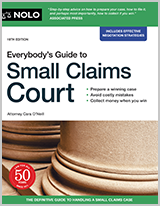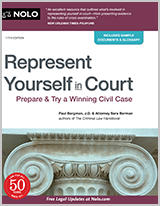Small Claims & Lawsuits
Small claims court is the perfect forum to resolve disputes without incurring costly legal bills. Many people successfully recover money for losses due to personal injury, property damage, contract breaches, and more. And with proper preparation and a strong case, you can too. These books will walk you through the process from start to finish. You’ll learn how to draft and file a complaint, serve it on your opponent, prepare and present your case, and collect your judgment. And, if you’re on the receiving end of a small claims lawsuit, you’ll learn how to spot simple errors that could defeat the case—like the plaintiff filing the case too late—and get tips that will help you put together your best defense.
Featured Products
Small Claims & Lawsuits Products by Category
Small Claims Books
Book & eBook
Everybody's Guide to Small Claims Court
Go to court armed with the tools and information you need to present and win your small claims case.
$20.99
$29.99 30% OFF
Book & eBook
Represent Yourself in Court
Be your own lawyer safely and efficiently with this easy-to-useguide to the courtroom!
$27.99
$39.99 30% OFF
Small Claims Forms
Online Form
Accident Claim Worksheet
This worksheet will help you keep track of the all-important details of your accident.
$34.99
Online Form
General Mutual Release
If you're in a dispute in which both sides claim the other's at fault, use this form to release each other from future claims.
$24.99
Online Form
Release for Personal Injury
Use this form to release someone from future claims involving a personal injury.
$29.99


